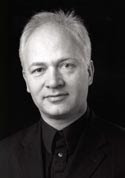 On Leap Day, the list of possible concerts to attend was shortened by one when the Guarneri Quartet had to postpone their planned all-Beethoven program at the Clarice Smith Center due to an injury. This made it possible to attend the equally alluring recital by violist Roger Tapping at La Maison Française, which was previewed by Jens Laurson for WETA (including an interview with Tapping). Unfortunately, the recording made by WETA, and much of the live experience of the inventive program, was spoiled by the unbelievable racket from the embassy's malfunctioning heating system. It sounded like an army of interns was shifting around office furniture on an upper floor, or like gerbils rolling in cylindrical metal cages through a long crawlspace. Unable to stop or shut off the heating system, a staff member apologized at intermission and offered an early glass of wine to calm the audience's nerves, a palliative that was eagerly accepted.
On Leap Day, the list of possible concerts to attend was shortened by one when the Guarneri Quartet had to postpone their planned all-Beethoven program at the Clarice Smith Center due to an injury. This made it possible to attend the equally alluring recital by violist Roger Tapping at La Maison Française, which was previewed by Jens Laurson for WETA (including an interview with Tapping). Unfortunately, the recording made by WETA, and much of the live experience of the inventive program, was spoiled by the unbelievable racket from the embassy's malfunctioning heating system. It sounded like an army of interns was shifting around office furniture on an upper floor, or like gerbils rolling in cylindrical metal cages through a long crawlspace. Unable to stop or shut off the heating system, a staff member apologized at intermission and offered an early glass of wine to calm the audience's nerves, a palliative that was eagerly accepted.The was doubly a shame because Tapping, the former violist of the Takács Quartet, had selected such an unusual, inviting program. Although he has freed himself from the demanding duties of touring with one of the best quartets around, Tapping is far from retired. Within the last year or two, we have reviewed him playing the Mozart quintets with the Auryn, Jupiter, Parker, and Daedalus quartets, and this is the second season in a row that he has given a solo recital at the French embassy with pianist Judith Gordon. The most appealing part of the program was the pair of Romantic bon-bons that framed the intermission. Schumann originally composed the Adagio and Allegro, op. 70, for horn and piano, but it has been adapted for several other instruments. It worked beautifully on the viola, especially with the elasticity of rhythm by the two performers, who made their best collective sound of the evening in this work. It was followed by Gabriel Fauré's Après un rêve, a delicate performance of this mélodie as melancholy and wistful as its poem.
If those were the sweet courses, the savory was provided by two modern masterpieces. Tapping's gentle, charming narration framed Hindemith's sonata for solo viola (op. 25, no. 1) perfectly. His performance of the wild, spastic fourth movement was a Stravinsky-esque romp, but it was the starkly introspective third and (especially) fifth movement that made the performance memorable, an exploration of somber melodies over gray, open intervals. The final composition of Dmitri Shostakovich's life was his viola sonata, op. 147, which opened here with a tense, intermezzo-like Moderato followed by a giocoso, grotesquely accented scherzo. The third movement, with its distorted quotation of Beethoven's "Moonlight" sonata, was plaintive and somber. Happily, with the Shostakovich, pianist Judith Gordon finally seemed willing to unleash the power of the embassy's Bösendorfer, which had sounded strangled for much of the evening. The opening Bach, an adaptation of the G minor viola da gamba sonata (BWV 1029), was the only musical disappointment, because the fast movements, rushed slightly, did not quite hang together.
The next concert at La Maison Française features the Chamber Orchestra of Philadelphia (March 11, 7 pm), in an all-French program.
No comments:
Post a Comment